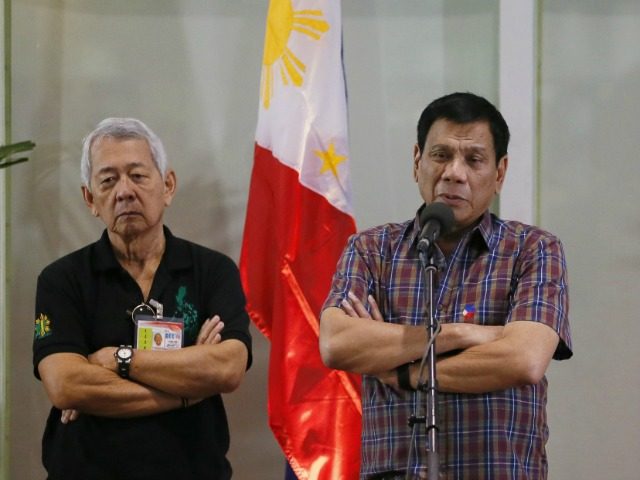Philippines Foreign Minister Perfecto Yasay addressed concerns that the nation’s new president, Rodrigo Duterte, is damaging Manila’s relations with the United States, arguing that America is an “esteemed and trusted ally” but that the Philippines cannot “forever be” America’s “little brown brother.”
“I am asking our American friends, American leaders, to look at our aspirations,” he told reporters Thursday in Washington, visiting the Center for Strategic and International Studies. “We cannot forever be the little brown brothers of America. … We have to develop, we have to grow and become the big brother of our own people.”
CNN describes the term “little brown brother” as a common “phrase used in the Philippines to refer to people that are trying to act like they’re American,” and notes that Yasay cushioned his remark by stating that Manila “will always view the United States as an esteemed and trusted ally with whom we share not just a common history and shared values, but a common destiny as well.”
In addressing the Philippines’ relationship with the United States, Yasay specified that the Duterte administration is not looking to crater longtime alliances, and attempted to explain why the president felt it necessary to deliver a profane tirade against American officials for stating they would like to discuss the potential for human rights abuses in the ongoing Philippine war on drugs. “You (have to) manage it correctly. You do not go to the Philippines and say, ‘I am going to give you something, I am going to help you grow, but this is the check list you must comply with – we will lecture you on human rights,'” Yasay told his audience, while reiterating that Duterte himself was “firmly committed to keep and respect alliances, including that with the United States.”
Duterte has encouraged both civilians and police to kill drug suspects who do not voluntarily surrender to authorities, and has issued a bounty – funded with leftover campaign money – to pay those who kill suspected drug traffickers. When the U.S. ambassador to the Philippines, Philip Goldberg, expressed concern about this and other Duterte remarks (such as joking about the rape of an Australian national in the southern Philippines), Duterte responded by calling Goldberg a “homosexual … son of a bitch.”
When President Barack Obama told reporters he hoped to discuss the potential human rights implications of the drug war with Duterte, the Philippine president referred to Obama as a “son of a whore.”
When Pope Francis made an official visit to Manila, his presence causing traffic jams in the city, Duterte referred to the pope as a “son of a whore.”
Duterte has asked the American military to leave the southern Philippines, home to an Islamic State-affiliate staging an insurgency. Duterte claims the region is not safe for Americans, who easily stand out among the natives of Mindanao.
In his remarks attempting to ameliorate ties with America, Yasay also insisted that the Philippines would continue to engage in joint maritime patrols with the United States within 12 nautical miles of its coast, not patrols that would challenge China or other neighbors in the South China Sea. Duterte had said earlier this week he was not interested in joint U.S. patrols in disputed South China Sea territory.
China claims the entirety of the South China Sea, which includes the exclusive economic zones of the Philippines, Vietnam, Brunei, Malaysia, Taiwan, and waters off the coast of Indonesia’s Natuna island. Before Duterte took office, his predecessor Benigno Aquino took the nation’s case against China to the Permanent Court of Arbitration at The Hague and won the case; China has vowed to disregard the verdict entirely.
As a candidate, Duterte insisted that he would not take military action against China, and has repeatedly referred to any potential conflict as a “massacre” for the Philippines. Yasay stated this week that he does not believe China is ready for a proper diplomatic discussion on the matter as long as they refuse to acknowledge The Hague case, however.
“To begin with, we cannot proceed on engaging China in bilateral talks where China says that we can only talk outside of the framework of the arbitral tribunal’s decision,” Yasay said. “Of course, the natural effect of engaging China in other areas of concern will precisely open the door for more open discussions of the dispute with the view of resolving the dispute peacefully.”
Despite concerns regarding the territorial dispute, Duterte’s administration is still seeking to potentially strike a deal to buy weapons from China. The combined news of a hesitance to engage in joint drills with the United States and interest in buying military equipment from China has alarmed many in the Philippines, prompting Duterte’s government to respond.
“The new foreign policy [of the Philippines] won’t make Philippines China’s lackey,” Communications Secretary Martin Andanar said Thursday. “When you create an independent foreign policy, it’s really just saying that we are a sovereign state, we are not beholden to any country and, once and for all, we can say to ourselves that we are standing up on our own two feet,” he explained, insisting, like Yasay, that ties to America will not be affected.

COMMENTS
Please let us know if you're having issues with commenting.